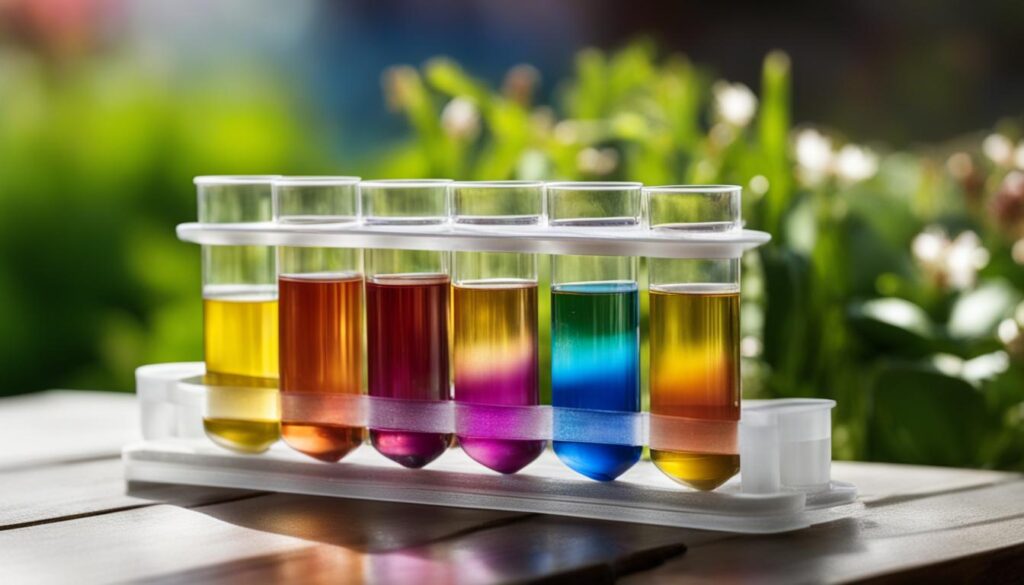When it comes to the optimal health of your roses, the soil conditions play a crucial role. One key factor to consider is the pH level of the soil. pH is a measure of how acidic or alkaline a substance is. Most plants, including roses, thrive in slightly acidic to neutral soil. So, what is the ideal pH range for roses? It’s between 6 and 7, with 7 being neutral. Maintaining the correct pH level is essential for proper nutrient absorption by the roses, as different pH levels can affect nutrient availability in the soil.
In the eastern part of the United States, soil tends to be naturally acidic, while in the western states, it is typically alkaline. If you’re uncertain about the pH level of your soil, conducting a soil test can provide valuable insights. Testing the pH can be done using pH meters, test kits available at local nurseries, or by sending soil samples to agricultural laboratories. Knowing the pH level of your soil and making necessary adjustments can ensure optimal rose growth and prevent problems caused by nutrient deficiencies.
Importance of Soil pH for Roses
The health and growth of roses heavily depend on the pH level of the soil. So, why is soil pH important for roses? Well, here’s the deal: the pH level directly impacts nutrient absorption by these beautiful flowers. When the pH level is incorrect, either above or below the optimal range of 6 to 7, it can lead to various issues such as stunted growth, yellowing foliage, burnt shoots, die back, and in severe cases, even death.
That’s why it’s crucial to test the soil pH before planting roses. By determining the soil pH levels, you can ensure that the conditions are ideal for the plants to thrive. Thankfully, pH testing kits are readily available at hardware stores, providing a quick and inexpensive way to assess the pH of your soil. Remember, it’s important to take samples from multiple locations in your garden for accurate results.
If the pH level is not within the optimal range, you might need some expert guidance. Don’t worry; you can always consult with local garden experts who have a deep understanding of the specific soil conditions in your area. They can help you make the necessary adjustments to bring your soil pH into the optimal range.
Testing and Adjusting Soil pH for Roses
Testing the pH levels of soil is an essential step in ensuring optimal growth and health for your roses. pH test kits, readily available at garden centers, offer a convenient and affordable way to determine the pH of your soil. These kits are designed to be user-friendly, making the testing process quick and hassle-free.
When collecting soil samples for pH testing, it is important to dig approximately 15 inches deep as rose roots can extend to that depth. Collecting samples from multiple areas in your garden will provide a more accurate representation of your soil’s pH levels.
If you require more precise and detailed information about your soil’s pH, consider taking your soil samples to specialized testing laboratories at universities or agricultural research centers. These testing facilities utilize advanced techniques to provide comprehensive soil analysis reports.
Adjusting the pH levels of your soil may be necessary to create the ideal environment for your roses. If your soil is too alkaline, there are several substances you can mix in to lower the pH. Ferrous sulfate, aluminum sulfate, and elemental sulfur are commonly used to acidify the soil. Ensure to follow the instructions for application, as over-application can lead to detrimental effects on your plants.
Alternatively, if your soil is slightly acidic, adding a combination of organic matter and wood ash can help bring the pH into the optimal range for rose cultivation. Organic matter, such as compost and well-rotted manure, can help slightly lower the pH levels and improve soil fertility. Wood ash, obtained from burned wood, contains potassium carbonate, which can help raise the pH of slightly acidic soil.
In the case of very acidic soil, you may need to add dolomite or ground limestone. These substances, when applied in the appropriate amounts, can help raise the pH levels and bring your soil into the optimal range. Be sure to carefully follow the recommended instructions to avoid over-application and potential harm to your roses.
Adjusting soil pH levels for roses may require time and patience, as it often involves ongoing adjustments and monitoring. Regular testing and observation will enable you to maintain the ideal pH levels for your roses, ensuring they have the best possible growing conditions.
Conclusion
Ensuring the optimal pH level for roses is crucial for their health and growth. Roses thrive in slightly acidic to neutral soil conditions, with a pH between 6 and 7. Maintaining the correct pH level is essential as it enables roses to efficiently absorb essential nutrients, which in turn promotes healthy growth and helps prevent diseases and pests.
Before planting roses, it is advisable to test the soil pH and make necessary adjustments based on the results. This proactive step can help create an ideal environment for roses to thrive. Additionally, incorporating organic matter, such as compost and worm castings, into the soil can significantly improve soil fertility, lower alkaline pH levels, and enhance drainage.
By taking care of the soil health and maintaining the optimal pH level, you can ensure the long-term success of your roses in the garden. Remember that healthy soil conditions are essential for maximizing nutrient absorption and supporting robust rose growth. So, invest time and effort in maintaining optimal soil health to enjoy beautiful and thriving roses.
How Does the Anatomy of a Rose Impact Its Preference for Acidic Soil?
The unveiling of rose botanical secrets reveals the importance of its anatomy in relation to soil preference. The structure of a rose’s roots, for instance, enables it to thrive in acidic soil by efficiently absorbing essential nutrients. Understanding its anatomy is crucial in cultivating healthy, vibrant roses in the right soil conditions.










